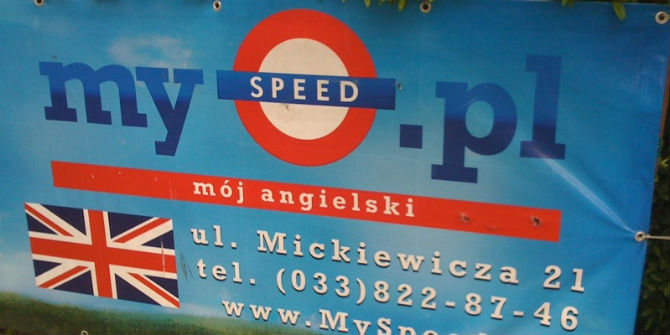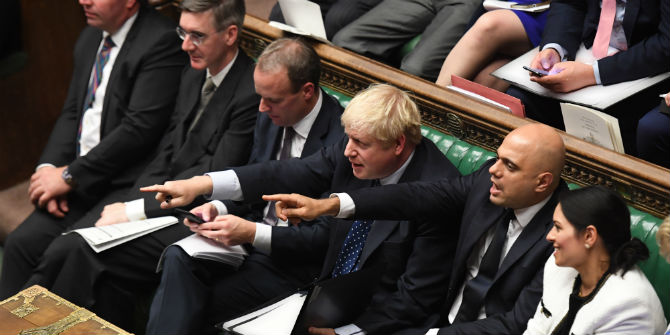



 After the British decision to leave the EU, Europe’s trajectory – even its destiny – is again up for discussion. In an increasingly volatile world, neither the EU nor the UK have an interest in a divorce that diminishes their influence as the balance of economic power shifts away from the North-Atlantic world. In this article, exclusive to LSE Brexit in English, Jean Pisani-Ferry, Norbert Röttgen, André Sapir, Paul Tucker and Guntram B Wolff propose a new form of collaboration – a continental partnership.
After the British decision to leave the EU, Europe’s trajectory – even its destiny – is again up for discussion. In an increasingly volatile world, neither the EU nor the UK have an interest in a divorce that diminishes their influence as the balance of economic power shifts away from the North-Atlantic world. In this article, exclusive to LSE Brexit in English, Jean Pisani-Ferry, Norbert Röttgen, André Sapir, Paul Tucker and Guntram B Wolff propose a new form of collaboration – a continental partnership.
The UK will want to have some control over labour mobility, as well as leaving behind the EU’s supranational decision-making. The proposed continental partnership would consist in participating in goods, services, capital mobility and some temporary labour mobility as well as in a new system of inter-governmental decision making and enforcement of common rules to protect the homogeneity of the deeply integrated market. The UK would have a say on EU policies, but ultimate formal authority would remain with the EU. This results in a Europe with an inner circle, the EU, with deep and political integration, and an outer circle with less integration. In the long run this could also serve as a vision for structuring relations with Turkey, Ukraine and other countries.
Introduction: Europe needs a seat at the top table
For nearly 60 years, a seemingly irreversible momentum towards integration within the framework of the European Union has, for many, defined the future of the continent. On 23 June 2016, the electorate of the United Kingdom made a sovereign choice to leave the EU. After the British decision to leave, Europe’s trajectory – even its destiny – is again a matter for debate. Brexit marks both a major constitutional change for the UK and a significant rupture for the EU. If only for this reason, the negotiation of the terms of Brexit must take a long-term view, beyond the possibly drawn-out negotiations that will begin in the coming months.

Over the next 15-20 years, the balance of economic and geopolitical power in the world is likely to alter significantly, with a new world top table of highly populated countries with massive economies. Our part of the world should want to have a seat at this table, so that our particular version of civilisation continues to be represented in the councils that seek to maintain peace, set rules and generate prosperity globally. Representation cannot be taken for granted. Of the EU’s three largest countries, Germany, France and Britain, none can be confident of having a place at the new top table.
More immediately, the constellation of security threats in Eurasia calls for managing the Brexit divorce so that it does not weaken Europe further at a time of major challenges to the security, freedom and wellbeing of its peoples. The current situation is a worrying reminder of the unavoidable interdependencies of geographical neighbours: the UK can leave the EU but it cannot relocate away from Europe.
The same can be said of economic links. Nearly half a century after the first enlargement of the EU in the early 1970s, the economic circumstances of the EU and the UK are now so interwoven that their prospects cannot be independent over any foreseeable horizon. Perhaps the greatest economic uncertainty for the UK is the future course and prosperity of the euro area, by far the largest economy in this region of the world. EU reform matters hugely for the whole continent with or without Brexit.
EU-UK cooperation will therefore remain profoundly important. Ways must be found to put it on a new and secure footing. Different approaches will no doubt be needed to reflect the substantive differences between, for example, trade and security issues. But any new framework will need to recognise that economics and politics are not neatly segmented. For example, they are interwoven in decisions on economic sanctions designed to help maintain international order. The new arrangements will need to be able to cope with the fuzzy boundaries of different public policy spheres.
It is vital, therefore, that the EU and the UK enter exit negotiations not only with a clear view of their near-term goals but also of their long-run interests and likely interdependencies.
On the British side (and indeed, to policymakers all over the developed world), the referendum result is a signal that urgent efforts are needed to ensure that the benefits of future economic growth can be enjoyed by all. Beyond any costs from the unavoidable medium-term uncertainty surrounding Brexit, other risks need to be navigated, including undoing trade integration with the EU (Sampson et al, 2016)[1].
On the EU side, there may be a temptation to apply punitive terms to the UK’s exit and the new relationship. Certainly Britain cannot be rewarded and it will not be allowed to pick and choose at will policies that it wants to participate in or abstain from. The EU needs to avoid reaching a series of ad hoc agreements with partner countries that are not based on clear principles. But an exceedingly unfavourable deal would be liable to damage everyone and would not achieve cohesiveness within the EU itself. For the EU, continued support should rest on reforms that can regenerate growth and jobs and, in particular, provide more secure foundations for the euro area.
An outcome that isolated the UK and blunted the incentives for EU reform would, in short, be in no one’s longer-term interests. The issues of EU/euro-area reform and how to define the relationship between the UK and the EU are therefore interlinked. With or without Brexit, the UK would have had to define its relationship with a reformed euro area (Sapir and Wolff, 2016). Similarly, increasing policy integration within the euro area, for example on banking, was already raising questions before 23 June 2016 about the relationship with the UK (Pisani-Ferry et al, 2012).

This paper leaves aside the issue of EU reform and focuses on the desirable EU-UK relationship after Brexit. Our starting point is the proposition that none of the existing models of partnership with the EU would be suitable for the UK. Nor would the off-the-shelf models recognise the importance of the multi-dimensional EU-UK relationship in other fields such as security and defence. The ‘“Norway”’ option would not allow limits on freedom of movement for workers, which is likely to be a priority for the UK government. It would also turn the UK into a pure rule-taker, a role that would be inadequate given the size and significance of the UK. Similarly, under the ‘“Swiss”’ model, the UK would become a pure follower of EU regulation in the sectors in which it would participate. Moreover, from an EU point of view this approach would be open to the justified criticism of the UK cherry-picking its participation in a shared public good.
There is also the option of a free-trade agreement. This would be technically feasible and could be based on a close agreement that also incorporated bilateral dispute-settlement mechanisms if political agreement could be reached. Such a structure would not, however, provide an adequate basis for the kind of deep economic integration that some kind of continued participation in the single market would constitute. The UK’s comparative advantage is largely in regulated services, which require an agreed regulatory framework in order to be provided across borders. For example in banking, the ability of banks and other intermediaries based in the UK to operate across the EU is based not only on a single set of rules but also on elements of supranational supervision (Schoenmaker, 2016). A trade agreement would not include such ‘passporting’ rights and so would constrain not only the City of London but also service companies operating outside the capital.
We therefore make a new proposal for the EU-UK relationship that is considerably less deep than EU membership but rather closer than a simple free-trade agreement. Policymakers in the UK and the EU will ultimately face the political choice between either pursuing something along the lines of our proposal or establishing a distant free-trade arrangement.
Our proposal might also have broader significance for Europe over the long-run as a basis for relationships with other neighbours. Beyond the immediate priorities of the UK situation, Brexit challenges the EU to reconsider and reorganise its relationships with other countries in the region, such as the EEA countries[2], Switzerland and, less pressingly, Turkey and Ukraine.
In the long run, our proposal could lead to a Europe of two circles, with the supranational EU and the euro area at its core, and an outer circle of countries involved in a structured intergovernmental partnership[3].
We believe that departing from the standard templates is essential for the success of the UK exit negotiations. Without a common vision of their shared future over the longer term, the UK and the EU risk being dragged into unprincipled bargaining and, albeit in slow motion, weakening their positions in the wider world.
The future of EU-UK relations: controlling labour mobility
At its core, the EU has been a political project. It is not just a group of states that cooperate, but a group of states which have created supranational institutions that have executive and judicial authority over EU member states and that can pass laws that are directly applicable throughout the EU. This is perhaps most visible in the form of the European Court of Justice, which can overrule national jurisdictions, or the European Parliament, which can, with the Council, pass laws that effectively replace national laws. The supranational authority of the EU is also manifest in the European Commission’s regulatory remit in, for example, competition policy and state aid.
A majority of the participating British electorate have in effect rejected this vision of the supranational exercise of voluntarily pooled sovereignty. It was especially significant that the UK electorate rejected one of the constituting elements of the single market: the free movement of workers. As of 2014, there were 5.3 million non-UK nationals resident in the UK, of whom EU nationals accounted for 2.9 million. Of those, 2.2 million currently work in the UK[4]. While there appears to be little conclusive evidence that the number of foreigners in an electoral district was a determining factor in the likelihood of that district voting to leave (Darvas, 2016), there can be no doubt that the Leave campaign tapped into seams of genuine concern about the scale and speed of immigration.

In our proposal, we take those two political constraints as given. The relationship between the UK and the EU that we propose would therefore be based on an intergovernmental form of collaboration, with no legal right to free movement for workers but a regime of some controlled labour mobility and a contribution to the EU budget. The goal of the proposal is to create a framework for continued close cooperation, even integration, on matters of common interest.
For some, the most controversial question is likely to be whether it is possible to have close economic integration comparable to the single market while partly limiting labour mobility. There are two ways of characterising the deeply integrated market. One is functional, and the other constitutional.
- The functional definition of a deeply integrated market consists of its central functional elements: (i) the absence of tariffs; (ii) a single set of rules or minimum standards; (iii) enforcement of those rules and standards under shared, supra-national jurisdiction; (iv) a single competition policy and state-aid control; and (v) the contribution to shared public goods, including through EU budget.
- But the EU’s market is also often defined in terms of the dimensions of an economic-political constitution. Essentially those dimensions are the so-called ‘four freedoms’ in goods, services, capital and people of the single market (eg Balassa, 1961). In that conception, free movement of workers is an essential element of the single market established with the Treaty of Rome.
We endorse the first view of a deeply integrated market. It is inconceivable that firms should operate freely in an economic area without ensuring a single set of rules or minimum standards that provide a level playing field across all the participating countries. State-aid control, competition policy and common rules or minimum standards are therefore indispensable parts of the single market, as is participation in an essential core of social rights, consumer protection and health and safety regulations. Future rules, standards and other policy areas that affect the integrated market may give rise to political controversy, as in any region seeking cooperative agreement.
As a political project the single market consists of all four freedoms. Arguably, freedom of movement of workers, whereby EU citizens are entitled to look for a job in another EU country and to work there without needing a work permit, constitutes the element that makes the single-market part of the EU into a political project[5]. Granting access to the domestic labour market to some 510 million citizens is a significant political choice and a powerful symbol of integration amongst EU countries. It is this political project that the UK electorate has effectively rejected.
From a purely economic viewpoint, however, goods, services and capital can be freely exchanged in a deeply integrated market without free movement of workers, though not entirely without some labour mobility. It is also possible for capital to move freely and for banking services to be provided across borders without free movement. Free movement of workers is, thus, not indispensable for the smooth functioning of economic integration in goods, services and capital. On the other hand, some degree of labour mobility is an essential counterpart of the free flow of goods, services and capital. Firms that operate in foreign countries need to be able to transfer workers abroad, at least for temporary periods, in order to produce efficiently. The four freedoms of the European single market are therefore closely economically connected, but not inalienable for deep economic integration[6]. Free movement of workers can be separated from the rest, but some temporary labour mobility is needed. Our proposal is, accordingly, about how to manage the governance of the single market in this functional sense without everyone being a full member of the EU.
The same logic applies to other areas of EU competence. As indicated, some of the chapters of the acquis communautaire are essential to the proper functioning of an integrated market for goods, services and capital. They should be retained in a new framework for the EU-UK relationship. Other chapters, such as energy or research, are however not essential and should be regarded as optional.
A proposal for structuring EU-UK relations: the Continental Partnership
Our proposal is about how a less-political definition of economic cooperation-cum-integration can be framed and organised. We propose the creation of a Continental Partnership (CP). The aim of this CP is to sustain deep economic integration, fully participating in goods, services, capital mobility and some temporary labour mobility, but excluding freedom of movement of workers and political integration. The CP should involve:
- Participation in a series of selected common policies consistent with access to the Single Market;
- Participation in a new CP system of inter-governmental decision making and enforcement;
- Contribution to the EU budget;
- Close cooperation on foreign policy, security and, possibly, defence matters.
The CP would build a wider circle around the EU without sharing the EU’s supranational character, except where common enforcement mechanisms were needed to protect the homogeneity of the single market. Members of the CP would be the EU, all EU-countries, the UK together with any other countries that participated.
The obvious challenge for EU-CP cooperation will be to preserve the processes and structures of the EU as a supranational entity and at the same time to ensure that CP members that are not part of the EU have a say in common matters. Two basic cases must be distinguished. The first concerns matters for which the EU already has an intergovernmental decision-making process. Here, the issue of cooperation can be relatively easily solved as the CP by its very nature is intergovernmental. Politically, this area of intergovernmental cooperation is important. In particular, the activity of the CP in the fields of foreign, security and defence policy – the areas in which Europe has to face a range of complex, persistent and existential threats – would be included.
The second, and arguably more difficult case, concerns areas in which the EU acts as a supranational body with (partial) sovereignty, including in particular all single market matters. Cooperation in this area means that although a CP member is not a member of the EU, it would get full access to the respective parts of the single market with all rights, opportunities and obligations other than freedom of movement for workers. In the following, we discuss how this cooperation could be organised.
One issue concerns the law making itself: We propose that CP countries would meet in a CP council, in which EU institutions would participate. At the level of the CP council, the UK would thus continue to participate in the numerous different formations where the details of single market regulation and other policies in which it would continue participating are discussed and negotiated. Obviously, the CP council could not pass EU legislation but CP partners would be involved in CP council readings of draft EU legislation and they would have a right to propose amendments.
EU law on the single market would, however, continue to be adopted through the normal EU legislative process. In practice, in the areas that concern the CP, the CP council would deliberate the legislative proposals before they are formally passed in the council of the European Union and the European Parliament, so that positions expressed by non-EU members could be taken into account throughout the legislative process and in the final decision.
Formally, it would be a political – not legal – commitment by EU member states to take into account the positions and deliberations in the CP council. Our CP council would therefore deal with this major political task. If the EU and its partners disagree within the CP council, the final say would formally remain with the EU. The non-EU CP members would then still have to implement the single market legislation in their national legislation or face restrictions on participation in the single market. The CP partners therefore would not have veto rights over the EU decisions but they would be closely involved in law-making at the intergovernmental level of the CP council.[7]
Conversely, CP members would have to accept the enforcement measures and jurisprudence that safeguards the relevant freedoms of the single market. Otherwise the integrity and coherence of the single market would erode. The key challenge will be to balance fairness with the necessity of homogeneity in application. In the case of EEA countries, an EFTA court is responsible. It consists of judges from the three EEA countries. However, rules ensure that the court follows the relevant case law of the ECJ (Allen and Overy, 2016; Wikipedia, 2016). Whether such a mechanism would be sufficiently strong in the case of the CP with a major country as the UK is for political and legal debate. We think that it may be necessary to contemplate instead an extended ECJ court composition involving judges from all CP countries. However this court would still be bound by ECJ case law.
Another important question is competition policy enforcement and state aid control (Petropoulos, 2016). In the case of EEA EFTA countries, the European Commission is largely in charge for any cases that have repercussions beyond borders[8]. Whether this is a feasible model for the CP should be for political debate.
Participation in the EU budget would also be vital. While many spending items of the EU budget might look outdated, the budget still constitutes an essential element of the integrated economic space. It is indispensable in the area of agricultural policy but, with its aim of structural convergence, is also important for opening up economic opportunities for less-developed parts of the EU. The EU budget also provides support for ‘catch-up’ countries. While the effectiveness of Structural Funds is a matter for debate, they serve as a quid pro quo for the adoption by cohesion countries of demanding single market legislation that might exceed what would be appropriate at their development level. Participation in the budget is therefore the necessary counterpart to participation in the single market. The UK would need to make a budgetary contribution.
From a political point of view, our proposal would constitute a significant concession by the EU to the UK on the free movement of workers. Politically, there may be a tendency in continental Europe to demand limits in other areas of the single market such as financial services. We would note, however, that under our proposal there is already a political ‘price’ to be paid by the UK, as CP membership entails significantly less political influence compared to EU membership. Whether that price is appropriate is a matter for political judgement.
Other CP policy areas: the economy, energy, climate and security
We see three areas in which the CP would operate. The first, as we have outlined, consists of accepting the acquis in all single market areas except those relating to the free movement of workers. Here, we would see the emergence of a system under which the UK would impose a quota system of some kind on the EU as a whole, while the EU would impose a quota on the UK[9].
Second, the CP would deal with shared external economic policies, in particular in trade and financial regulatory matters. The CP should aim for global influence in trade, financial regulation and climate and energy policies. Its creation would ensure that Brexit does not result in a long-term weakening of Europe’s voice in global negotiations, bearing in mind the growing dispersion of international power.
Trade policy is an exclusive competence of the EU. We could see an interest of non-EU CP countries participating in EU trade policy through the CP council, thereby choosing to give up their ability to negotiate individually new free trade agreements. Again, ultimate decision making would, however, remain with the EU, which legally would retain formal competence. But there are also substantial obstacles and it will therefore be a matter of intensive political discussions (Sapir, 2016).
Financial regulatory matters are often negotiated and agreed on in global institution such as the Basel committees. In these fora, Europe is represented by a combination of EU institutions and the authorities of some of its member states. In the medium to long term, we would expect an increasing concentration of the external representation of the EU through EU institutions such as the European Central Bank. It would make sense to coordinate the positions of the Bank of England, other CP central banks and the ECB. Whether or not CP countries will ever want to cede their representation to common institutions would be a matter for future discussions.
Finally, energy and climate policies are also areas for the CP. This could involve participation in the EU emissions trading system (ETS), coordination of CP positions in international climate negotiations and participation in an energy union if it progressed.
The third area of CP policy should consist of an active role in foreign, security and defence matters. Russia’s annexation of Crimea and military incursion into Eastern Ukraine are not bilateral issues, but threaten Europe’s peaceful order as a whole. This new status quo is not just a challenge for EU countries.
The same holds for the turmoil in the Middle East and North Africa. The spill-over effects from the conflicts in this region to Europe are unprecedented in recent times.

No European nation state will be able to manage these and other future threats single-handedly. The CP should emerge as a forum and even an active participant in foreign security and defence policy.[10] Justice and security affairs are a shared EU competence, which means that it is not a purely intergovernmental set-up and EU institutions have formal roles. This raises difficult, but hopefully surmountable, legal questions of how the CP-EU collaboration should be structured.[11] The UK, one of the two permanent European members of the UN Security Council and one of the current EU members able to project forces overseas, will remain a crucial partner on these matters. Europeans cannot and must not solely rely on the US as the guarantor of European security. The Cold War is over, the Pacific sphere is of growing significance, new threats in forms of cyber-conflict and terrorism have materialised, and US politics is likely to face its own domestic challenges for some time to come. For this reason we believe that closer cooperation in this area is important and will be even indispensable over the medium-term if Europe is to be able to adequately to react to threats.
Geographical scope
One advantage of the proposed Continental Partnership is the flexibility of its governance model. At its core it consists of participation through the CP Council in the EU law-making process while simultaneously accepting the ultimate authority of the EU and the enforcement of commonly agreed rules or minimum standards. Its nature is thus essentially intergovernmental. The Continental Partnership could thus be open to other European countries that might want to join.
It will be important not to overstretch the flexibility of the CP in the economic area. The central issue here is the move away from free movement of workers. But the CP should be flexible in relation to the security and defence policy area and potentially also external economic relations. Since security and defence policy are at the core of national sovereignty, we could see some CP members participating in the joint security partnership while others would not.
One important question is about the members of the European Economic Area (EEA) that are not part of the EU (Iceland, Liechtenstein and Norway). These three countries fully participate in the single market but do not have any significant say in the law-making process of the single market. We could imagine that these three EEA countries could have the right to join the CP if they wished[12]. We could also see the CP as an attractive model for Switzerland since it wishes to limit free movement – but, as a counterpart to joining CP, it would have to adopt the full set of single market regulation in other areas.
The creation of a Continental Partnership might also provide a basis for coming to honest terms in the negotiations with Turkey[13]. Arguably, one of the reasons why some EU member states would never accept Turkey joining the EU is free movement and, more broadly, the political nature of the EU. Framing the relationship with Turkey in terms of EU accession was, therefore, always liable to be awkward. But provided there is a shared will to strengthen the partnership and provided that essential political conditions are met, we see it as possible and perhaps even desirable to move towards including Turkey in the Continental Partnership in the medium- to long-term. Offering Turkey the prospect of a structured partnership with the EU in which it would have a voice could contribute to deterring a drift away from democracy and associated values.
In the longer term, the CP might also provide a framework for a strengthened relationship with EU neighbours in the east (Ukraine). It is an open question whether a similar template might be used for relationships with neighbours to the south (Morocco, Tunisia). Again, the intergovernmental character of the partnership and the exclusion of free movement of workers could contribute towards addressing existing stumbling blocks.
Becoming a member of the CP would require compliance with criteria, assessed via clear procedures. For the UK, the negotiations over its participation in the CP should be held in parallel with the EU exit negotiations to avoid unnecessary and mutually damaging disruption. EEA members could also qualify for CP. Other countries would have to comply with the necessary legislative acquis before being admitted to the CP. There should also be a definition of shared values of the CP, including issues such as the rule of law and democracy.
Conclusions
The British vote to withdraw from the EU marks a major constitutional change for the UK and a significant rupture for the EU. Our proposal is to turn the rupture into an opportunity to reorganise Europe in two circles. The inner circle constitutes the EU with political aims and supranational constitutional structures. The outer circle, of European cooperation, adding countries not in the EU would have more flexibility and be based on an intergovernmental structure, the Continental Partnership. Most importantly, CP countries would not participate in the freedom of movement of workers, would not share the political commitment to ever closer union, and would have less political influence over decisions of common interest.

Our proposal requires the UK and the EU to make tough choices. The UK will have to answer the question of whether it wants to continue to maintain close economic cooperation with the EU and whether it wants to maintain and potentially even strengthen its engagement in security and, conceivably, defence matters. This is ultimately a political choice that must be spelled out unambiguously.
The EU will have to agree among its members to put aside punitive motives and reach an economic settlement that grants control over labour mobility to the UK while allowing continued access to and participation in important parts of the single market. This is a political choice on which clarity is needed. The EU countries will also need to reflect on whether this model would be adequate for other neighbouring countries[14].
Finally, our proposal should be combined with a strengthened EU and a strengthened euro area. As a start, it involves concrete progress using the community method. Rendering the EU’s own construction more effective and increasing political legitimacy is not only desirable for its own sake but also essential for the political stability of Europe with different levels of cooperation. We see the deepening of the euro area and the building of a continental partnership, in what would amount to concentric circles, as close complements that are in the interest of both the UK and the EU.
Our proposal is driven by the firm belief that neither the EU and its member states nor the UK have an interest in an escalation of tensions or costly disengagement following Brexit. Neither the UK nor the continuing members of the EU can escape their geographical interdependencies. Both have a stake in economic and political stability in Europe. Today’s volatile and dangerous world requires its nations to collaborate to confront new and multiple challenges. The longer-run prospect of a future world in which Europe is only one amongst many powerful regions demands the same.
Brexit is now a reality. It carries risks. It can be turned into an opportunity. We hope that our proposal can provide a benchmark, even a vision, for the undoubtedly difficult negotiation that lies ahead.
This paper is the outcome of a dialogue among the five authors during the summer. It is published simultaneously in London, Brussels, Berlin and Paris under the sole responsibility of the authors, who write in their personal capacities. Jean Pisani-Ferry is Professor at Hertie School of Governance; Norbert Röttgen is Chairman of the Foreign Affairs Committee of the German Bundestag; André Sapir is Professor at the Université libre de Bruxelles and Senior Fellow at Bruegel; Paul Tucker is Chair of the Systemic Risk Council and a Fellow at the Harvard Kennedy School of Government; Guntram Wolff is Director of Bruegel. ©Authors.
See also:
The Continental Partnership proposal: a reply to five main criticisms
Footnotes
[1] There will be costs in the way of replacing trade with the EU with trade with other, more distant countries due to the gravity law in international trade.
[2] Iceland, Liechtenstein, Norway.
[3] In 2002, Romano Prodi, when he was president of the European Commission, wanted “to see a ‘ring of friends’ surrounding the Union and its closest European neighbours, from Morocco to Russia and the Black Sea”, who would be ”sharing everything with the Union but institutions” (Prodi, 2002).
[4] As of Q1 2016 (Office for National Statistics, 2016). That number has increased from 752,000 in 2003 (before EU enlargement). Immigrants to the UK have been shown to be significant net contributors to public finances and to economic growth (Dustman and Frattini, 2013; Wadsworth et al, 2016).
[5] Labour mobility is economically desirable because workers can move to the places where their productivity is highest. It is also socially desirable because it constitutes a fundamental personal freedom to go and work where one wishes.
[6] We therefore contradict the current view of the European Commission President (Juncker, 2016).
[7] Our proposal therefore goes well beyond the participation of EEA countries such as Norway that meet in the EEA Joint Committee at the level of ambassadors some 6 times per year with little influence on the council of the EU.
[8] For a detailed discussion, see Allen and Overy, (2016).
[9] We assume that the EU will define a joint migration policy. We would reject a quota system by which the UK would impose quotas on individual EU countries.
[10] Theresa May (2016) in her speech on April 25 as home secretary said that in the EU the UK would benefit from issues such as the European arrest warrant, which has allowed the UK to bring 675 suspected or convicted criminals to face justice in UK. It has also been used to get terror suspects. Arguably, the CP should find a way to continue that useful cooperation, in line with EU laws.
[11] Justice and security affairs are formally a shared competence in the EU: EU Member States cannot exercise competence in areas where the Union has done so. It is conceivable that the EU may want to move significantly further in this area in the next 10 years. This would raise political and legal questions for the cooperation via the CP.
[12] Specific grandfathering provisions might be needed to allow them to continue to be full member of all elements of the single market thereby continuing to participate in the freedom of workers.
[13] For an earlier proposal to include Turkey in the wider circle, see Sapir and Wolff, (2014).
[14] In our discussion, we leave aside the already variable geometry within the EU, in particular the differentiation between the euro area and the EU. Arguably, the management of that differentiation will increase in importance after Brexit as non-euro area countries will constitute only 15 percent of EU GDP. Its importance will also grow with further integration in the euro area.
References
Allen and Overy (2016) ‘Implications of EEA membership outside the EU-different name, same game?
Darvas, Zsolt (2016) ‘Brexit vote boosts case for inclusive growth’, blogpost, Bruegel
Dustmann, Christian and Tommaso Frattini (2013) ‘The Fiscal Effects of Immigration to the UK’, CDP No 22/13, Centre for Research and Analysis of Migration
Juncker, Jean-Claude (2016a) ‘Speech by President Jean-Claude Juncker at the EP Plenary session on the conclusions of the European Council meeting of 28 June 2016 and the Informal meeting of the 27 Heads of State of Government of 29 June 2016’, European Council Meeting
May, Theresa (2016), Speech on Brexit, April 25, 2016
Office for National Statistics (2016) ‘EMP06: Employment by country of birth and nationality’
Petropoulos, Georgios (2016) ‘Brexit and competition policy in Europe’, blogpost, Bruegel
Pisani-Ferry, Jean, André Sapir and Guntram Wolff (2010) ‘The messy rebuilding of Europe’, Policy Brief 2012/03, Bruegel
Prodi, Romano (2002, December) ‘A Wider Europe-Proximity Policy as the key to stability’, speech presented at the Sixth ECSA-World Conference.
Sampson, Thomas, Swati Dhinigra, Gianmarco Ottaviano and John Van Reenen (2016) “How ‘Economists for Brexit’ manage to defy the laws of gravity”, Centre for Economic Policy Research
Sapir, André (2016) ‘Should the UK pull out of the EU customs union?’, blogpost, Bruegel
Sapir, André and Guntram Wolff (2016) ‘One market, two monies: the European Union and the United Kingdom’, Policy Brief 2016/01, Bruegel
Sapir, André and Guntram Wolff (2014) ‘The Great Transformation: Memo to the Incoming EU Presidents’, Policy Brief 2014/04, Bruegel
Schoenmaker, Dirk (2016) ‘Lost passports: a guide to the Brexit fallout for the City of London’, blogpost 2016/06, Bruegel
Wadsworth, Jonathon, Swati Dhingra, Gianmarco Ottaviano and John Van Reenen (2016), “Brexit and the Impact of Immigration on the UK” Brexit Analysis No. 5, London: Centre for Economic Performance
Wikipedia (2016) ‘EFTA Court’.







With respect UK has not taken the decision to quit the EU. That decision will not be taken until Article 50 is invoked. The referendum was advisory, not compulsory.
“The referendum was advisory, not compulsory.”
Many Barristers disagree
“Constitutionally the referendum result was decisive and binding and not just advisory. The referendum result not merely authorises but positively mandates the government to exercise its legal power to give notice under Article 50.”
http://www.lawyersforbritain.org/brexit-referendum-binding.shtml
By “barristers” you of course mean a small Eurosceptic campaigning group who want the UK to leave the EU.
One can only hope none of these gentlemen will be involved in the actual negotiations on the EU side.
Handing over the UK exactly that what it was told it could not get before they voted to exit would be an incredible mistake. It would be an invitation for wobbly EU states to get out at no cost whatsoever. Only for countries the size of Germany or France the membership of the EU would still have any actual benefits.
If a plan remotely like the above would be agreed upon I, as a Dutch citizen, would favor holding a referendum on the ratification and in such a referendum I would vote against it.
Forget it Brussels. We don’t want any “CP Council” binding us to EU laws. All that is needed is a free trade agreement and if you can’t do that then trading under WTO rules will do just fine. And you can forget about contributions to the EU budget too.
You do realise that a run of the mill free trade agreement gives the UK less access to the EU market than it currently has? The idea that we can just scrap every obligation and receive the same access to the EU in trade terms is a complete fantasy that seems to be perpetuated by people who don’t have the faintest understanding of how trade actually works in practice. Let’s enter the real world please.
So, what do the authors propose to do with the exisiting UK citizens in the EU and the EU citizens in the UK?
That is just desperate. The EEA was difficult enough to get going, and anything even close to providing the same benefits is going to come with free movement of labour. Ask the Swiss. The point is to economically, politically and culturally integrate the EU in the long run. Not wiping out individual cultures, but making them appreciate each other, understand each other and learn to live together. It’s the core of the whole project.
More practically, it would greatly complicate the situation in Europe. There simply is no benefit for the EU to create yet another entity outside the EEA, the EFTA and the EU for any other reason than parking the UK (so it can be in the single market without being in EFTA). Another entity that would pursue some of the same goals as the EU would just dissipate efforts. The EU can afford to get its act together, work on its own problems and wait for the UK to accept a “parked” status or rejoin as a normal country.
Tendentious claptrap.
The article makes positive suggestions towards maintaining a single European market in the aftermath of the UK Brexit vote. Such constructive ideas are welcome, but the proposed model is unlikely to meet the needs of either core EU countries or the “outer” members such as Britain in the long term.
The proposed “Continental Partnership” would view the UK and other non-core members as lesser satellites orbiting around a central European Union sun. This is not a vision that will satisfy UK voters, but more importantly it misses a less voiced, but critically important idea behind Brexit. This is the need to pivot our future trade relations away from a purely European focus, towards a new 21st century model of Global trade. Both Europe and America must quickly wake up to the realities of the new Global economy. By 2050 the largest international cities around the World will broadly converge in both GDP and income per capita, resulting in very different patterns of Global trade. Within 30 years our industry and commerce will be dominated by over 5 billion consumers in Asia, and 2 billion in Africa. Meanwhile Western Europe and North America will have just 500 million citizens each.
For the moment, Europe and America still have the influence and ideas to promote progressive liberal aims of inclusive and sustainable growth on a level Global playing field, but we must act quickly. Rather than a continental European focus, we should be aiming for a “Global Partnership” to create a single regulated market, including as many of the G20 countries as is practical. It is already becoming clear that such a “Global Economic Community” will be needed to govern international trade effectively in the future. To quote from your own article:
“It is inconceivable that firms should operate freely in an economic area without ensuring a single set of rules or minimum standards that provide a level playing field across all the participating countries.”
Yet the existing WTO model has allowed just such an “inconceivable” system to flourish, so that today we have largely unrestricted Global trade in both goods and services, but without any central body which can act to ensure a regulated marketplace – one that actually works in the interests of all Global citizens.
At one time I hoped that the European Union might provide the best model for cooperation to achieve a single Global market, but the EU has instead been led down a path of greater political integration, towards the vision of an ultimate “United States of Europe”. Whether or not the EU decides to pursue this vision, the UK will certainly not want to be part of a federal Europe. Furthermore this approach cannot become the future of Global cooperation, since the last thing that voters want is any form of Global government – at least not in any way that we understand the idea of “government” today.
Instead, the future of a Global Partnersip will be closer to your own description, where “Countries would not participate in the freedom of movement of workers, would not share the political commitment to ever closer union.”
We now stand at a crossroads for the future of international cooperation, and our vision must be Global. The Brexit vote has shaken up the whole model of transnational relationships, creating an opportunity which cannot be wasted. If we try to build our future models based on 20th century Eurocentric thinking we will end up seeing Europe, and possibly even the United States, increasingly marginalised over the next 30 years. But if instead we can create bold new thinking for the 21st century, based on Global Goals, we could for the first time build a regulated Global single market that can provide better economic opportunities for all.
Robert P Bruce – author http://www.TheGlobalRace.net
“today we have largely unrestricted Global trade in both goods and services” , maybe for global trade in goods but definitely not global trade in services which constitutes for visa free travel and limitation, attempt to impose a quota like the author proposed may promote retaliation in the form of protectionism to goods.
“but without any central body which can act to ensure a regulated marketplace – one that actually works in the interests of all Global citizens.” – the WTO doesn’t work in the interest of all global citizens, mathematically the bigger countries have an advantage in trade against smaller countries, WTO rules works in the interest of large countries and well prepared countries, hence the reason for trading blocs.
“a regulated Global single market” – has faced fierce resistance in the US already! Donald trump may lose but his protectionist ideas will carry one. “A regulated Global single market” might never exist as countries would lose their sovereign and have to accept demands from much bigger countries like china or face trade retaliation, unless a strong enough trading bloc is formed to balance out the numeric disadvantage which is what the EU. An addition factor is the amount of protectionism existing in an country, take for example south korea its imposes heavy regulation and yet you can still buy Samsungs in all developed countries, why? Because they have more cards to play due their already existing level of protectionsim, you lift one trade barrier I’ll lift one trade barrier, the one that has the most trade barriers in the beginning wins. UK doesn’t practice protectionism at all and will lose out.
What is needed in UK isn’t outward looking, the trade deals that EU provided for UK already gave it plenty of international exposure but instead it should be more inward looking and fix internal issues fix NHS, disability care, balanced spending, popping that housing bubble already. This might sound short-termism but a right now even the most international market exposure will not help the UK. Trade deals can’t solve internal governance problems.
BREXIT is indeed the quintessential opportunity to engage into a broad and transparent debate about the peaceful future of our common Europe. How do we preserve the key elements of this incommensurably important peace project for all European people and regain a widely shared commitment to a continent with broadly shared economic opportunities and benefits for all, preservation of our multicultural heritage and trust in our institutional foundations and their governance?
What is needed – in addition to the proposed two circles – is a third most inner circle for the Euro area, within which all Euro members will commit to a set of rules and shared policy fundamentals to rebuild the trust and confidence of the financial markets, the partner regions and the people in Europe into the Euro currency and its institutional foundation. Given the apparent and increasing disparities within the existing Euro area since the financial crisis after 2008 the relationship between the inner Euro circle and the wider EU circle should allow for weaker Euro members to leave the inner circle for a transitional sabbatical period and return once a clear and unwavering commitment to the common rules of the inner circle are economically and institutionally warranted.
This is similar to a proposal made by Lord Owen, an ex-British Foreign Secretary, a few years back and is a good idea. I think if it had been on the ballot paper in the referendum it would have won.
I think it answers a number of needs:
-the need of the EU to get on and further integrate the Euro area
-an alternative way of being European for the non-Euro states
-a way for the EEA/EFTA states to get a say in Single Market law making without having to give up the sovereignty they have been refusing to give up
-a way to bring Turkey, Albania, Ukraine etc into the EU ambit without bringing them into the EU